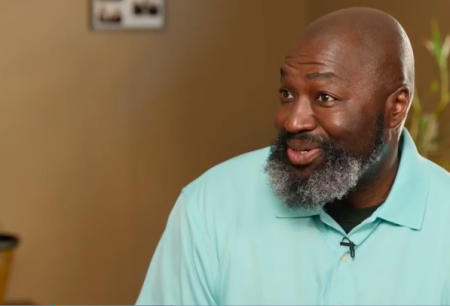Inmate freed thanks to Trump's prison reform dedicates life to helping others

One of the first prison inmates to be released under a criminal justice reform law signed by President Donald Trump has dedicated the rest of his free life to helping those in need — a calling he said God has placed on his heart.
In 1995, Matthew Charles was sentenced to 35 years in prison for selling crack cocaine and for several gun violations in Clarksville, Tennessee. After hearing the Gospel in prison, Charles became a Christian, devoting his time to reading the Bible and helping other inmates. Over the next 21 years, he became a law clerk, led prison Bible studies, and managed to keep himself from a single disciplinary infraction.
During this time, he became “genuinely repentant of his life before encountering the Grace of Christ, not offering empty excuses about his past, but taking ownership,” as a pastor would later describe him.
In 2016, Charles was unexpectedly released from prison: "God moves miraculously. It was in 2016 when US Judge Kevin Sharp granted my reduction of sentence," he told CBN.
Finally free, Charles created a full life for himself. He ate at his favorite restaurants, became actively involved in a local church, and started volunteering at a food pantry. But two years later, he found himself once again in prison after a court reversed the previous judge's ruling that his sentence was "unfair."
Still, Charles was determined to keep the bitterness at bay: "I count that as a blessing of God, even being released for that two-year period," he said.
His case soon gained national attention, with celebrities and advocacy groups backing his cause. But in the end, it was the First Step Act that granted Charles his freedom.
Signed into law by President Trump December 21, 2018, the bill includes a provision to apply the Fair Sentencing Act retroactively, allowing for courts to shorten unduly harsh prison terms.
On January 3, 2019, Charles left prison and immediately traveled to Washington D.C. to thank some of those responsible for his release, including the First Step Act's sponsor Rep. Doug Collins, R-GA.
"When I saw the story, as I am right now, I cry. Because this is what makes this job, after everything else, this makes it good," Collins told Charles.
He was also invited to the State of the Union Address, where the president said the former inmate "represents the very best of America."
"Thank you, Matthew. Welcome home,” President Trump said.
Now home in Nashville, Charles continues to volunteer at the food pantry. He told Fox News that God placed it in his heart "to help the poor, the homeless, and single-parent families" when he first accepted Jesus, and that's what he plans to do for the rest of his life.
"I'm just taking it day by day, waiting to see what doors of opportunities avail themselves for me. God placed it in my heart to help people and I want to continue to do that," he later told CBN.
The United States has the highest rate of incarceration in the world, with more than 2.1 million people locked up in prisons and jails across the country
The First Step Act, which received bipartisan support, enables evidence-based rehabilitation programs like Prison Fellowship to be utilized in federal prisons nationwide; increases judicial discretion in certain federal drug offense cases; and allows incarcerated individuals to qualify for early release, among a number of other things.
James Ackerman, President and Chief Executive Officer of Prison Fellowship, praised Trump for signing the criminal justice reform bill.
“With the stroke of his pen, President Donald Trump took a bold step in making America safer by signing into law federal criminal justice reform—the FIRST STEP Act,” he said. “This legislation will increase the access of faith-based and nonprofit organizations, like Prison Fellowship, to provide desperately needed programming in the federal prison system and help reduce recidivism. From our work in many states across the country, we can say without hesitation that these programs restore lives—putting people on a new path and eventually reduce crime.”





















